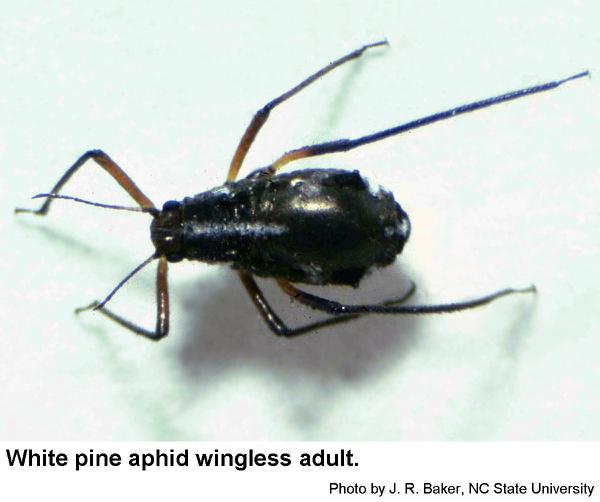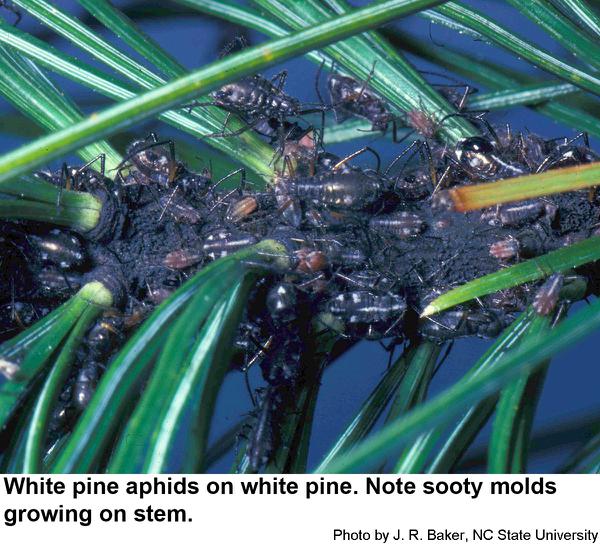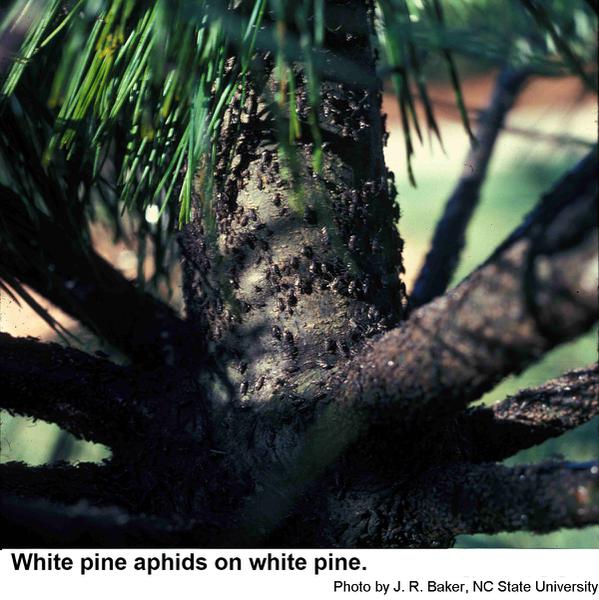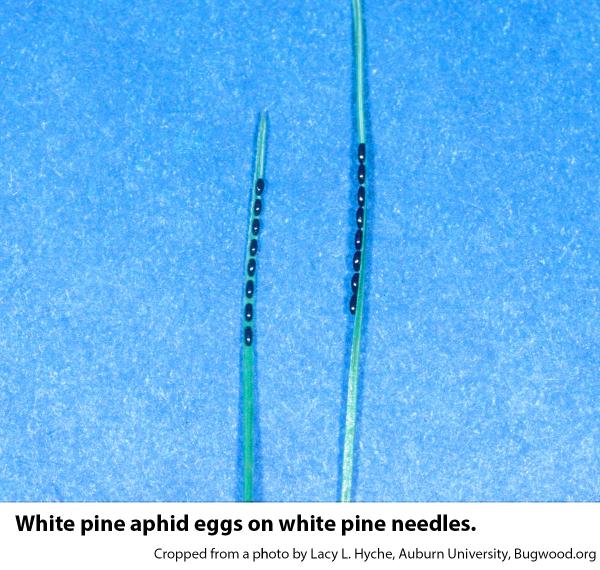Description and Biology
White pine aphids, Cinara strobi, are in the group of Cinara aphids sometimes referred to as giant conifer aphids. Most Cinara aphids are brown, but the white pine aphid is black with white spots. They are often numerous in the fall and abundant throughout late winter and early spring especially if the weather is mild. However, at upper elevations, these aphids overwinter as eggs. The eggs hatch very early in the spring and the aphids may become very abundant in early spring. Up to six generations occur each year. The life cycle is complex. Adults of the spring and summer generations consist of females only, some winged and others wingless, all of which give birth to living young. Males and egg producing females occur only in the late fall generation, which produces the overwintering eggs.
Host Plant
White pine aphids on feed on eastern white pine twigs, branches, and trunks. Light to moderate infestations cause little damage, but heavy infestations produce large quantities of honeydew in which sooty mold fungi can grow. Severe infestations can cause flagging and death of twigs and seedlings.
Residential Recommendation
Outdoors in warm weather, parasitic wasps, lady beetles, hover fly maggots, lace wings and other predaceous insects feed on aphids so that aphid populations often decrease rapidly as well. Aphid populations are sometimes devastated by Verticillium lecanii, a fungus that infects aphids in damp weather as a sort of deadly athlete's foot. Should these natural agents fail, soaps and oils are labeled for aphid control in the landscape. There is some advantage to using oils as they are reported to help disperse sooty molds more quickly than any other pesticide (also they are relatively safe for humans). However, avoid using oils late in the growing season as oils remove the waxy bloom from the needles that gives white pines its charming bluish green color. At that time it might be better to use a systemic insecticide such as imidacloprid.
White pine aphids are sometimes discovered indoors as white pine Christmas trees dry out and the aphids start crawling down on the presents and on nearby flooring and walls. Be careful not to crush these aphids as their blood may leave a purple stain. Sometimes residents confuse white pine aphids with ticks, but ticks are tough and not easily crushed between ones fingers.
References
- Aphids on Ornamental Landscape Plants. Steven Frank. 2009. Entomology Insect Notes, NC State Extension Publications.
- Cinara Aphids on Christmas Trees in North Carolina. Sidebottom, J. 2009 (update). NC State Extension. Christmas Trees.
- Insect and Related Pests of Shrubs. Baker, J. R. ed. 1980. NC Agricultural Extension Service publication AG-189. 199 pp.
- White Pine Aphid. In Krischik, V. and J. Davidson. 2013. IPM (Integrated Pest Management) of Midwest Landscapes. University of Minnesota Center for Urban Ecology and Sustainability.
- Extension Plant Pathology Publications and Factsheets
- Horticultural Science Publications
- North Carolina Agricultural Chemicals Manual
For assistance with a specific problem, contact your local N.C. Cooperative Extension Center.
This Factsheet has not been peer reviewed.
Publication date: Nov. 13, 2013
Reviewed/Revised: Oct. 22, 2019
Recommendations for the use of agricultural chemicals are included in this publication as a convenience to the reader. The use of brand names and any mention or listing of commercial products or services in this publication does not imply endorsement by NC State University or N.C. A&T State University nor discrimination against similar products or services not mentioned. Individuals who use agricultural chemicals are responsible for ensuring that the intended use complies with current regulations and conforms to the product label. Be sure to obtain current information about usage regulations and examine a current product label before applying any chemical. For assistance, contact your local N.C. Cooperative Extension county center.
N.C. Cooperative Extension prohibits discrimination and harassment regardless of age, color, disability, family and marital status, gender identity, national origin, political beliefs, race, religion, sex (including pregnancy), sexual orientation and veteran status.




